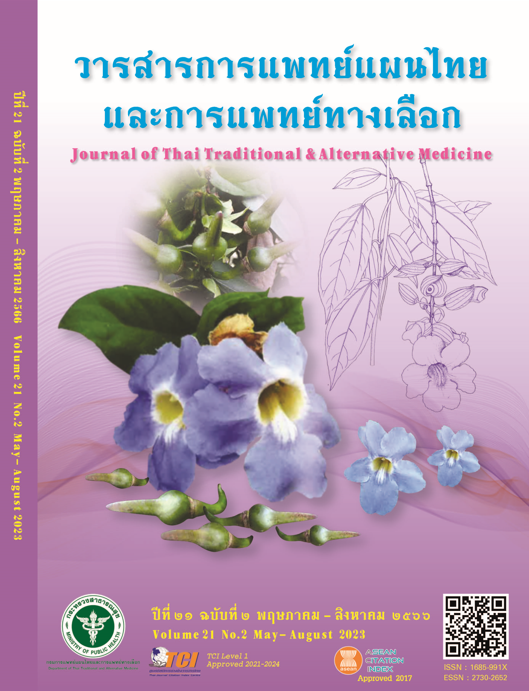Efficacy and Safety of Thai Traditional Medicine Formula “Benja Amarit” Extract in Patients with Hepatocellular Carcinoma: A Clinical Trial Phase II
Main Article Content
Abstract
Introduction and objective: Hepatocellular carcinoma (HCC) is a major life-threatening disease affecting human health worldwide including Thailand. “Benja Amarit” (BJA) is a Thai herbal medicine formula for HCC patients available in state health-care facilities. Nevertheless, clinical evidence to support the efficacy of BJA extract for HCC treatment is still lacking. This study aimed to explore the efficacy of BJA extract on the survival rate of patients with HCC.
Methods: A double-blind randomized controlled trial was conducted in HCC patients with Child-Pugh class A or B, who could not receive standard treatment. We used the case (BJA group) to control (placebo group) ratio of 2:1. Both groups received doses of treatment depending on body weight throughout the study. One-year survival, hazards ratios, alpha fetoprotein (AFP) levels, and the quality of life (QoL) of the patients were evaluated. Clinical outcomes were evaluated every 28 days for five times. An intention-to-treat analysis was used. Kaplan-Meier, log-rank test, Cox proportional hazard model, Chi square or Fisher’s exact test, Mann Whitney U test, and Generalized Estimating Equations (GEE) or Multilevel model (mixed model) were performed using STATA version 14.
Results: Of all 81 HCC patients, 45 participated initially in the study (32 in BJA group and 13 in control group). By the end of the 12-month study period, there had been 40 deaths (88.9% of all participants): 13 (100%) in the control group and 27 (84.4%) in the BJA group. Based on a comparison between the two groups, their survival rates were not different [crude hazard ratio (HR) = 0.67, 95% CI = 0.34–1.31].
Discussion: A significant HCC death prevention in the BJA group was observed with multivariate adjustments for sex, age, tumor sizes, major symptoms and AFP levels (HR = 0.25, 95% CI = 0.06–0.97, p-value = 0.046). Moreover, flatulence (HR = 3.54, 95% CI = 1.017– 11.71, p-value = 0.046) was also found to be another factor increasing the risk of HCC deaths. However, no significant difference of QoL between the two groups was detected, nor were serious adverse events (AEs) reported in the BJA group.
Conclusion and recommendation: This study on BJA treatment indicates that BJA extract is a factor for decreasing mortality in HCC patients.
Article Details

This work is licensed under a Creative Commons Attribution-NonCommercial-NoDerivatives 4.0 International License.
References
Fongchan S, Vorapongsathorn S, Bhavabudananda P, Chooratna K. Liver Cancer
Prevention and Control. Thai Cancer Journal. 2019;39(2):64-7. (in Thai)
Chonprasertsuk S, Vilaichone R-k. Epidemiology and treatment of hepatocellular carcinoma in Thailand. Japanese Journal of Clinical Oncology. 2017;47(4):294-7.
Cabibbo G, Enea M, Attanasio M, Bruix J, Craxì A, Cammà C. A meta-analysis of survival rates of untreated patients in randomized clinical trials of hepatocellular carcinoma. Hepatology. 2010;51(4):1274-83.
Horneber M, Bueschel G, Dennert G, Less D, Ritter E, Zwahlen M. How many cancer patients use complementary and alternative medicine: a systematic review and metaanalysis. Integr Cancer Ther. 2012;11(3):187-203.
Wu P, Dugoua JJ, Eyawo O, Mills EJ. Traditional Chinese medicines in the treatment of hepatocellular cancers: a systematic review and meta-analysis. Journal of Experimental & Clinical Cancer Research. 2009;28(1):112.
Tantipidoke Y, Tantipidoke R, Nakaphan T, Teerachaisakul M. Traditional Thai Medical Perspectives on Liver Cancer and Its Treatment: Results of a Qualitative Study. Journal of Thai Traditional & Alternative Medicine. 2018;16(3):390-404. (in Thai)
Healing Arts Practices Division. General traditional medicine textbook. Bangkok: Office of the Permanent Secretary Ministry of Public Health; 2540. (in Thai)
Phraya Pisanuprasatwet. Wetsuksa Peatsatsungkap. Bangkok: Thai Yosse bridge printary; 1908. (in Thai)
Thai Traditional Medicine Research Institute. Thai traditional medicine practice Guideline of liver cancer treatment. Bangkok: Department of Thai Traditional and Alternative Medicine, Ministry of Public Health; 2016. (in Thai)
Thai traditional medicine research institute. Study of the use of Benja-Amaritta in liver cancer patients according to Thai traditional medicine. Bangkok: Department of Thai Traditional and Alternative Medicine, Ministry of Public Health; 2016. (in Thai)
Thai Traditional Medicine Research Institute. Report of the cancer treatment by Benja-Amaritta recipe in Thai traditional and complementary medicine hospital. Bangkok: Department of Thai Traditional and Alternative Medicine, Ministry of Public Health; 2014. (in Thai)
Panyaphu D, Worakunphanich W, Bancheun K, Panichanukonkul A, Suemanotum P, Khantong K, Jeabna K, Tungsukruthai P, Itharat A, Teerachaisakul M. Quality control, anti-cancer effect in vitro, toxicity, and actual use research of Benja-Amaritta for cancer treatment according Thai traditional medicine. Thailand Research Symposium 2016; 2016. (in Thai)
Chow SC, Shao J, Wang H, Lokhnygina Y. Sample Size Calculations in Clinical Research. 3rd ed. Chapman and Hall/CRC2017.
Schoenfeld DA. Sample-size formula for the proportional-hazards regression model. Biometrics. 1983;39(2):499-503.
Schipper H, Levitt M. Measuring quality of life: risks and benefits. Cancer Treat Rep. 1985;69(10):1115-25.
Thongprasert S, Intarapak S, Saengsawang P, Thaikla K. Reliability of the Thai-modified Function Living Index Cancer questionnaire version 2 (T-FLIC 2) for the evaluation of quality of life in non-small cell lung cancer patients. J Med Assoc Thai. 2005;88(12):1809-15.
Lengsawangwong O, Wimuktayana S. Liver cancer. Journal of Health Research. 2019;12(2):151-7. (in Thai)
Charoenmukayananta S. Primary Prevention of Hepatocellular Carcinoma. Journal of Health Systems Research. 2009;3(3):434-9. (in Thai)
Yapasert R, Sripanidkulchai B, Teerachaisakul M, Banchuen K, Banjerdpongchai R. Anticancer effects of a traditional Thai herbal recipe Benja Amarit extracts against human hepatocellular carcinoma and colon cancer cell by targeting apoptosis pathways. J Ethnopharmacol. 2020;254:112732.
Liu X, Li M, Wang X, Dang Z, Yu L, Wang X, Jiang Y, Yang Z. Effects of adjuvant traditional Chinese medicine therapy on long-term survival in patients with hepatocellular carcinoma. Phytomedicine. 2019;62:152930.
Liao YH, Lin CC, Lai HC, Chiang JH, Lin JG, Li TC. Adjunctive traditional Chinese medicine therapy improves survival of liver cancer patients. Liver Int. 2015;35(12):2595-602.
Yossathera K, Worakunphanich W, Teerachaisakul M, Stienrut P. Traditional Thai medicine formuls : Benja Amarit in liver cancer patients : a safety and quality of life. Journal of Thai Traditional & Alternative Medicine. 2017;15(3).301-11. (in Thai)


